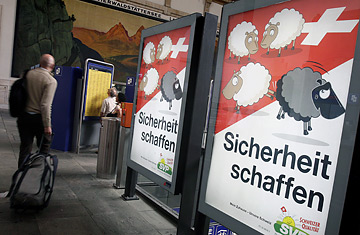
Posters of the right-wing Swiss People's Party (SVP) show a black sheep being kicked across the frontier by three grinning white sheep, with the slogan "For More Security."
As if tailored to suit its pastoral surroundings, the large poster plastered to a wall on the winding road into a tiny village 55 miles north of Geneva uses cartoon sheep to illustrate its message: Against the backdrop of a Swiss flag, three white sheep are shown kicking a lone black one out of their flock. Ugly, perhaps, but the message of exclusion resonates deeply with Pomy's 620 inhabitants, a predominantly conservative flock with strong populist leanings. "Too many foreigners abuse the Swiss system," says the hamlet's mayor, Jean-Pierre Grin. "Our solidarity has its limits."
The poster is part of the campaign by the right-wing Swiss People's Party (SVP) for the October 21 parliamentary elections, and it has sparked a controversy that has shaken up Switzerland's usually placid politics. From street corners to the corridors of power, people are heatedly debating whether the poster incites racism or accurately reflects outrage over skyrocketing youth violence and other crimes perpetrated by some immigrants.
The "black sheep campaign" calls for foreigners who have repeatedly been convicted of violent crimes to be deported after serving their sentences. Once the SVP collects the 100,000 signatures required by the Swiss system, the initiative will be presented to the parliament and eventually brought to a nationwide referendum. The party also wants parliament to debate a measure that would deport immigrant families of minors who commit serious offenses.
The SVP attributes the recent rise in violent crime to resident foreigners, but although some official studies do show immigrants committing a disproportionate share of serious infractions, the picture painted by the statistics is far from clear. But that won't stop SVP's effort to make political hay out of the immigrant-crime issue, particularly the recent dramatic rise in youth violence.
According to the Federal Statistics Office, juvenile convictions surged from 2,000 in 1999 to 14,106 in 2005. Two recent cases that sparked public outrage involved a 5-year-old-girl being raped by a 13-year-old from the Balkans, and the gang-rape of a 13-year-old by a group that consisted mostly of immigrants.
"If parents are not willing to control their children, should these families be allowed to remain in Switzerland and endanger the population?" asks SVP legislator Ulrich Schluer. "We have the right to live in a safe environment."
The remedies proposed by the SVP have, of course, been fiercely rejected by all other political parties, human rights groups, and the government. They see the SVP's anti-foreigner rhetoric as demagoguery designed to stampede the electorate. "We are shocked at how foreigners are used to heat up the political climate, and how some parties are promoting such negative images," says Doris Angst, Secretary General of the Federal Commission against Racism. Adds Swiss President Micheline Calmy-Rey: "This racist campaign disgusts me because it stirs up hatred."
Despite its inflammatory discourse, the SVP — which has morphed from a small agrarian party into a national force with the largest number of seats in the parliament — insists it is not against all immigrants. "We welcome those who come legally and respect our laws," Schluer says.
In fact, Switzerland has a long tradition of opening its borders to immigrants and refugees, and some 22% of the population are now foreign-born, including such celebrities as Formula 1 racing driver Michael Schumacher, singers Shania Twain, Tina Turner and Phil Collins, and many others. But the influx of newcomers from Eastern Europe and Africa, many of whom the SVP charges are engaged in drug dealing and other criminal activities, has stoked widespread fears of a way of life under threat.
Those concerns have strengthened Pomy farmer Andr Chevalley's support for the SVP. Sitting at a wooden table in his sprawling farmhouse, Chevalley says that "bad" foreigners have no place in Switzerland. "If they commit a crime, they have to be thrown out," he says. "I absolutely think the SVP has the right idea."
Nearby, in the village's community hall, mayor Grin — elected on the SVP ticket — says the party's platform of fiscal conservatism and tightening asylum and naturalization laws, reflects the core values of his village: "The vast majority of people here relate to those ideas and follow faithfully the party's platform, whatever the issue."
There are some foreigners in the village, but they are welcome, says Grin, because they are from the countries of the western European Union, "so cultural integration is not a problem." But, he warns, "when it comes to foreign criminals, it's clear they don't belong here. If these people compromise our security, then yes, they should be expelled."
Despite the absence of "foreign criminals" in their midst, Pomy's burghers are converting to the SVP cause. "I rarely voted for the SVP in the past," says a woman tending her garden at the village's edge, who identifies herself only as Yvette. "But the foreigner problem is getting out of hand, and only SVP is offering solutions."
Such solid grass-roots support is likely to maintain the SVP's plurality in parliament — even though the rest of the political class prefers to see it as the black sheep of Swiss politics.
